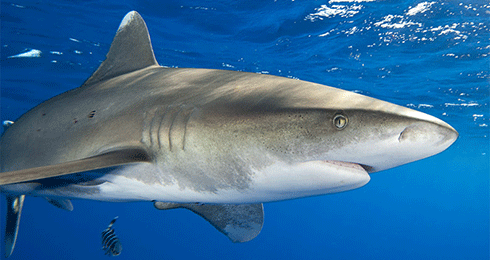
|
Published: 3 February 2014
Hiding our splashes from sharks may reduce attack risk
Western Australian researchers will attempt to ‘mask’ the noise of swimmers from sharks after receiving a grant from the WA State Government's Shark Hazard Mitigation Strategy.

|
|
Curtin researchers will attempt to make humans less detectable to sharks. Credit:
Curtin University
|
The project, led by Dr Christine Erbe at Curtin University’s Centre for Marine Science and Technology, will look at characterising noises made by people swimming, surfing and kayaking that are detectable by a number of large shark species.
Researchers will then compare shark behaviour when the human noises are detectable to when they are masked, to see if masking typical swimmer noises can be effective at disrupting detection of humans.
‘If we can successfully identify a difference in behaviour, masking sounds could be broadcast into the water by speakers along WA beaches or perhaps by the development of small, personal maskers that could be used by swimmers and other water users,’ Dr Erbe said.
‘There are already a number of approaches aimed at reducing shark attacks, such as the use of nets to keep sharks out of swimming areas and repelling sharks with deterrence devices.
‘But our approach is a little different, as it looks at interfering directly with the shark's ability to detect humans.
‘We believe this approach is minimally invasive, will have minimum environmental impact and is the only long-lasting solution, as, in contrast to deterrence devices, there is no risk of the sharks becoming accustomed to a stimulus and ceasing to respond to it.’
With a grant worth $130,124 over three years, the team will record the noise of typical human activity at Perth beaches where shark encounters have occurred previously.
The researchers will then determine the exact sound cue of human activities that can be detected by sharks and design and compare two kinds of artificial signals – one that mimics a typical beach environment and one that masks the sound cue detected by sharks.
Dr Erbe believes there is a fundamental lack of understanding of the mechanisms that various species of shark use to detect and locate possible prey, whether it be through sight, smell, sound or other cues.
‘It is likely that sound is the cue used most by sharks – it’s the only cue that travels fast and over long ranges underwater,’ Dr Erbe said.
‘Sound provides the most effective long-range stimulus in the marine environment, with most marine megafauna relying on sound for communication, navigation and foraging.’
The funding is part of the second round of applied research funding through the State Government's Shark Hazard Mitigation Strategy. The first round funded Curtin's Centre of Marine Science and Technology to research sonar detection and imaging of sharks.
Source: Curtin University



